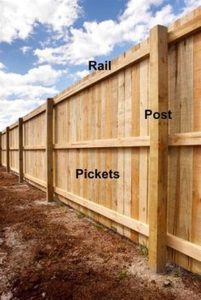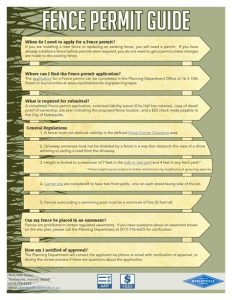Explore fence permit requirements, legal ramifications, property value impact, liability issues, and steps to rectify permit deficiencies for informed home improvement decisions.When it comes to property enhancements, a fence can add both aesthetic appeal and functional benefits to your home. However, jumping into a fencing project without the necessary permits can lead to a multitude of headaches for homeowners. Understanding the essential requirements surrounding fence permits is crucial, as neglecting this step can result in serious legal ramifications, negatively impact property value, and pose liability risks. In this blog post, we will explore the real estate implications of skipping the fence permit process, from the potential fallout to the steps needed to rectify the situation. Whether you’re considering a new fence or currently have one without a permit, this guide will equip you with the knowledge to navigate this often-overlooked aspect of homeownership.
Understanding fence permit requirements
When it comes to erecting a fence on your property, understanding fence permit requirements is crucial. Different municipalities have varying rules about fencing, and failing to adhere to these can lead to numerous complications.
Before you start the process of installation, check with your local zoning office or building department. They will provide you with the specific requirements for obtaining a fence permit, including height restrictions, materials allowed, and property line regulations. Most areas require you to submit a fence permit application along with a site plan showing the proposed location of the fence.
In addition to local laws, homeowners associations may also have their own guidelines which must be followed. These rules often focus on the aesthetics of the neighborhood and may dictate the type, color, and style of fence that can be built.
Potential legal ramifications of no permit
When it comes to erecting a fence on your property, understanding the legal ramifications of operating without a permit is paramount. Building a fence without the necessary permits can expose homeowners to several legal challenges that may complicate real estate transactions and lead to costly fines.
If a homeowner decides to build a fence without the required permits, they may find themselves facing a range of legal issues, including fines and penalties imposed by local authorities. These fines can vary significantly depending on the jurisdiction, with some municipalities having strict enforcement policies that can result in hefty fines. Furthermore, if the local building department discovers the unauthorized fence, the homeowner may be ordered to demolish or remove the structure, incurring additional costs and legal headaches.
Beyond immediate fines and enforcement actions, building a fence without a permit can also lead to more serious litigation issues. If neighbors dispute the placement or legality of the fence, this could escalate into a legal lawsuit that might involve property lines, easements, and other property-related conflicts.
Impact on property value and resale
When considering the installation of a fence, many homeowners overlook the impact on property value and resale. A well-designed fence can enhance the curb appeal of a property, while an improperly permitted or poorly constructed fence can detract from it. To understand this dynamic, it’s essential to explore how fencing influences a property’s marketability.
Many potential buyers factor in the presence of a fence when evaluating a property. A secure, visually appealing fence can signal safety for families with children or pets, potentially raising the property’s appeal. Conversely, a fence that hasn’t been built to code or lacks the necessary permits may raise red flags for buyers, indicating that the homeowner did not invest the time or effort into ensuring compliance with local regulations.
Moreover, failing to obtain the proper fencing permits can lead to expensive legal disputes with neighbors, ultimately affecting the resale value of the home. If a buyer discovers a fencing issue during the inspection process, it can lead to renegotiation of price or even deter buyers altogether. In short, fencing decisions not only carry local legal implications but also directly affect the perceived and actual value of a property in the real estate market.
Liability issues without proper permits
When it comes to residential properties, installing a fence can seem like a straightforward home improvement project. However, one of the significant challenges property owners face is understanding the liability issues that arise when a fence is installed without the appropriate permits. Failure to obtain a permit can lead to several unforeseen complications that may affect both the homeowner and neighboring properties.
Firstly, if a fence is erected without the necessary permits, homeowners may find themselves in violation of local building codes. This can lead to legal ramifications, including fines and the requirement to remove or alter the fence to comply with regulations. Moreover, if a non-permitted fence causes damage to a neighbor’s property or poses a safety risk, the homeowner could be held liable for any injuries or damages that occur. In these scenarios, insurance coverage may also be affected, as many policies will not cover incidents that arise from unpermitted structures.
Secondly, the absence of a proper permit can create significant challenges when it comes to selling a property. Potential buyers might be wary of purchasing a home with a non-permitted fence, fearing the potential legal troubles down the line. This can ultimately affect the property’s market value, leading to longer selling times or below-market offers. It’s crucial for homeowners to be aware of the implications of not securing a fence permit, as it can have lasting effects on both personal liability and overall property worth.
Steps to rectify the lack of permit
When you realize that your fence was constructed without the required permit, it’s essential to act promptly to rectify the situation. The first step is to check your local building codes and regulations to understand the specific requirements for obtaining a fence permit in your area.
Next, consider reaching out to your local building authority. They can provide guidance on the necessary documents you will need to submit, any fees that might be applicable, and the overall process for amending your fence’s status. This communication is crucial, as they might require specific inspections or modifications to your existing fence.
Finally, if your fence is found to be in violation of any laws or regulations, you may need to take corrective actions. This could involve making alterations to the fence or, in some cases, removing it entirely.
Frequently Asked Questions
What is a fence permit and why is it important?
A fence permit is a legal authorization required by local regulations to construct or modify a fence on your property. It’s important to ensure compliance with zoning laws, property lines, and safety regulations, preventing potential legal disputes.
What are the potential consequences of not having a fence permit?
Without a fence permit, you could face fines, orders to remove the fence, or legal action from neighbors or local authorities. It may also affect property resale value and complicate boundary disputes.
How can not having a fence permit affect property value?
Not having a fence permit can lead to devaluation of the property due to potential violations or the need for costly modifications. Prospective buyers may hesitate to purchase a property with unresolved legal issues.
Are there exceptions where a fence permit is not needed?
Yes, some areas may have exceptions for smaller fences or specific materials. It’s essential to check local regulations or consult with a local authority to determine if your project requires a permit.
How can homeowners obtain a fence permit?
Homeowners can typically obtain a fence permit by submitting an application to their local planning or building department. This may include providing plans, paying a fee, and following specific guidelines.
What should I do if I built a fence without a permit?
If you’ve built a fence without a permit, it’s advisable to consult your local building department. They can guide you on how to rectify the situation, potentially by applying for a permit retroactively or adjusting the structure.
Can you dispute a fence permit application denial?
Yes, homeowners may dispute a fence permit denial by appealing the decision through the local zoning board or proper governmental body, presenting evidence or arguments that support their case.





